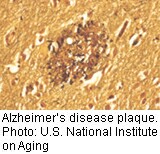
WEDNESDAY, July 11 (HealthDay News) — Brain scans using a new radioactive dye can detect early evidence of Alzheimer’s disease in people who show little or no signs of the disease and may help predict future mental decline, a new study says.
It included 151 people who completed thinking and memory tests and underwent a PET (positron emission tomography) brain scan with the new dye called florbetapir (Amyvid). They were then followed for three years.
The dye binds to amyloid plaques that occur in the brains of people with Alzheimer’s disease, enabling doctors to see if patients have the plaques and how much.
At the start of the study, 69 patients had normal mental function, 51 had mild impairment and 31 had Alzheimer’s disease.
After 18 months, thinking and memory test results of patients who started off with mild impairment and whose brain scans revealed evidence of amyloid plaques worsened to a greater degree than those who had mild impairment but had no evidence of plaques at the start of the study.
The patients with amyloid plaques at the outset were also more likely to go on to develop Alzheimer’s. After three years, 29 percent of the plaque-positive patients with mild impairment developed Alzheimer’s compared with 10 percent of those with mild impairment who had no plaques at the start of the study.
Among participants with normal mental function at the start of the study, those with evidence of brain plaques showed more mental decline after 18 months than those with no sign of plaques.
“Even at a short follow-up of 18 months we can see how the presence of amyloid plaques affects cognitive [thinking] function,” study co-leader Dr. P. Murali Doraiswamy, a professor of psychiatry at Duke University, said in a university news release. “Most people who come to the doctor with mild impairment really want to know the short-term prognosis and potential long-term effect.”
There is no cure for Alzheimer’s, but being able to detect the early stages of Alzheimer’s could help advance efforts to find ways to fight the disease and enhance the care and treatment of current patients, he explained.
“For the most part we have been blind about who would progress and who wouldn’t, so this approach is a step toward having a biomarker that predicts risk of decline in people who are experiencing cognitive impairment,” Doraiswamy said.
The study, published online July 11 in the journal Neurology, was funded by Eli Lilly/Avid Radiopharmaceuticals, which markets Amyvid. Doraiswamy receives advisory and speaker fees from Lilly/Avid.
According to the U.S. Food and Drug Administration, Amyvid was approved in April for use in imaging tests for patients being evaluated for Alzheimer’s.
More information
The U.S. National Institute of Neurological Disorders and Stroke has more about Alzheimer’s disease.

